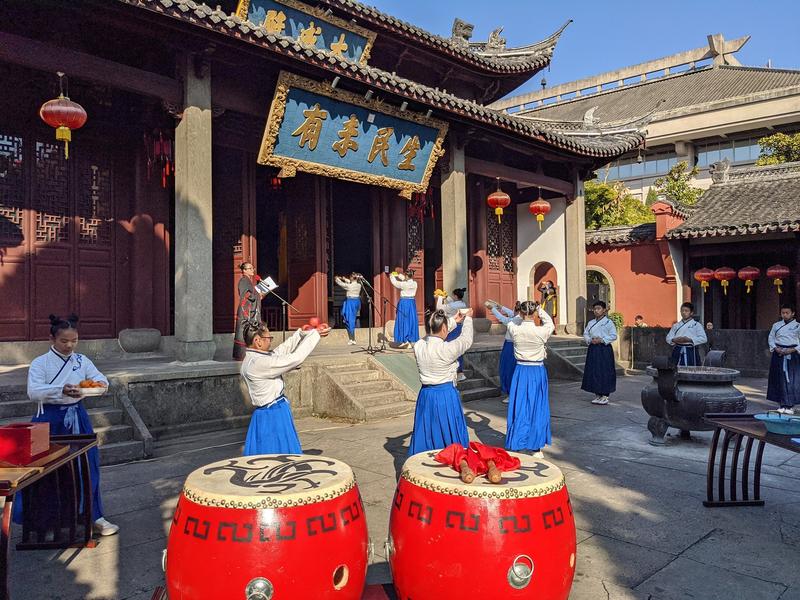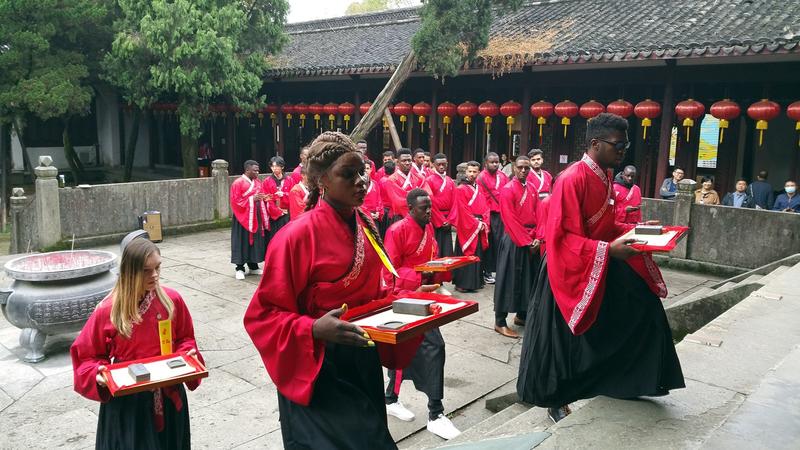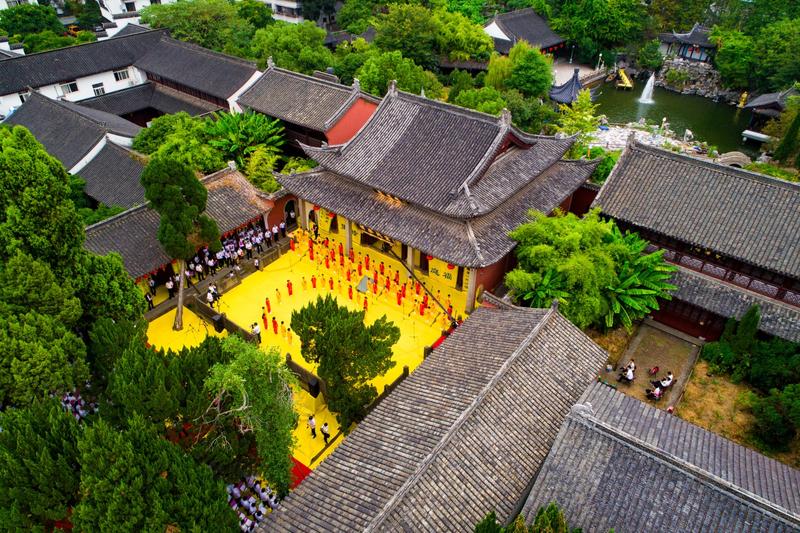Southern temple builds on the past to link tourism with the philosophical heritage of Confucius, thus securing it for future generations, Yang Feiyue reports.
 Students participate in an event celebrating Confucianism at the Confucius ancestral temple in Quzhou, Zhejiang province. (PHOTO PROVIDED TO CHINA DAILY)
Students participate in an event celebrating Confucianism at the Confucius ancestral temple in Quzhou, Zhejiang province. (PHOTO PROVIDED TO CHINA DAILY)
Red walls and black tiles render an ambience of solemnity over the Confucius ancestral temple in southern China. The temple faces a Confucius culture park across the street, where a 12-ton, 9-meter-tall bronze statue of the philosopher dominates the view.
The presence of these elements delighted Tsytsiura Kseniia during a recent visit to the temple, located in Quzhou city, Zhejiang province.
"I've been fascinated by Confucius and the culture of Confucianism since childhood," says Kseniia, who is from Ukraine and currently working and studying in China.
This was due to the influence of his grandfather who, decades ago, taught at Wuhan University, Kseniia says.
She was impressed by the creative design of the admission ticket, which carries a miniature version of The Analects of Confucius.
"I used to be under the impression that the Confucius ancestral temple was only admissible to their descendants," Kseniia says, adding that she was surprised to learn that the temple was run as a tourist attraction.
"Offering access to the public shows the openness and inclusiveness of Confucianism," she adds.
Kseniia has been among an increasing number of visitors who have gone to the temple, one of the only two such Confucian ancestral sites in the country and a key cultural heritage site under national protection.
Not as widely known as its counterpart in Qufu, Shandong province, which was established in 478 BC, one year after Confucius' death, the Quzhou temple was built more than 1,700 years later, because of the migration of the philosopher's family.
 Youngsters pay their respects to Confucius at the temple in Quzhou, Zhejiang province. (PHOTO PROVIDED TO CHINA DAILY)
Youngsters pay their respects to Confucius at the temple in Quzhou, Zhejiang province. (PHOTO PROVIDED TO CHINA DAILY)
After Kaifeng, the capital of the Song Dynasty (960-1279), was conquered by Jin Dynasty (1115-1234) forces, Emperor Gaozong and remnants of the Song Dynasty retreated to South China. The eldest grandson of the 48th generation of Confucius' descendants, Kong Duanyou, also moved South, settling in Quzhou with his wife.
Construction of the temple was approved by Emperor Lizong of the Southern Song Dynasty (1127-1279) after an appeal from the local prefecture chief. Since then, the descendants of Confucius have settled in Quzhou and the city has become their second largest home.
It has been rebuilt three times and repaired 10 times over the past 800 years.
In 1998, the Quzhou government invested 18 million yuan ($2.55 million) to repair the temple and, in 2004, the city resumed marking the birthday of Confucius. Since 2009, directors of Confucius Institutes abroad have been invited to attend the ceremony.
In recent years, the temple has remained open to the public, albeit with stringent pandemic control measures in place.
"We have continuously received visitors, including descendants and enthusiasts," says Wang Zhaocheng, who is in charge of the development of the temple culture and tourism zone.
"Every month we have welcomed visitors that hail from all over the world."
 International guests experience Confucian culture. (PHOTO PROVIDED TO CHINA DAILY)
International guests experience Confucian culture. (PHOTO PROVIDED TO CHINA DAILY)
Local authorities found that many international visitors have shown great interest in the southern Confucius temple and they share their experiences on social media.
"We have come to realize that tourism provides wings to culture, and culture is the soul of tourism," Wang says.
"The temple is not only the most important culture and tourism resource of Quzhou, but also a calling card, and a window that effectively frames the distinctive characteristics of China," Wang says.
At the moment, the local authorities are working to upgrade the temple culture and tourism zone into a national 5A-ranked destination, the highest rating level.
"We believe it will further enhance the role of the temple as a bridge for cultural inheritance and exchanges," Wang says.
The Quzhou government has tapped into the essence of Confucianism over the years and taken bold steps to spread the culture.
Government officials have taken the lead in restoring the practice of ancient rituals, such as bowing with both hands folded in front to show mutual respect and proffer best wishes, or to bid farewell.
Free trips to more than 100 scenic spots in the city have been offered to travelers worldwide and the amount of public space has been increased to enhance their experience and increase the opportunity to interact with Confucianism at the temple.
Last year, the Quzhou authorities planned out the temple culture and tourism zone that will bring together 10 major local scenic spots, including the ancient city wall and Xin'an Lake. The zone is expected to cover an area of more than 3.5 square kilometers and is aimed at integrating local ancient city culture, sports, leisure and ecology.
To date, more than 5 billion yuan has been put in to improve infrastructure and renovate the facilities within the zone.
 A bird's-eye view of the Confucius ancestral temple. (PHOTO PROVIDED TO CHINA DAILY)
A bird's-eye view of the Confucius ancestral temple. (PHOTO PROVIDED TO CHINA DAILY)
An international culture exchange center for the game of Go, an immersive art museum, standardized sign boards and toilets have all been put into service.
The tourist service center, a historical block, a theater and an academy of classical learning are all under construction and will be completed soon. Boating experiences will also be available shortly.
Kong Lingli, a 76th generation descendant of Confucius, is looking forward to the completion of the project.
He relocated to Quzhou from Ningbo, Zhejiang, and took over the running of the Confucius ancestral temple after his father Kong Xiangkai passed away last year.
Kong Lingli says he believes that it's important for the culture to take root among the following generations before cultural revitalization can be achieved.
"The culture and tourism zone will be an effective approach to make that happen," Kong Lingli says.
He has been popularizing Confucianism among youngsters in schools in Quzhou and has carried out a program that promotes the study of The Analects of Confucius. To help upgrade the temple zone, he has also developed new study tours that provide an explanation of the thoughts of Confucianism and offers the appreciation of an ancient ginkgo tree, with a history of more than 500 years, which is located at the temple.
He has also come up with creative cultural products featuring temple-themed elements, including ginkgo nut cake and pancakes imprinted with the words of Confucius.
"The idea is to construct a channel where tourism can help decode the cultural gene of Confucianism," he explains.
Jin Feng, a scenic spot rating expert, says the construction of the temple culture and tourism zone is an innovative practice to promote the culture of Confucianism in southern China.
"Outstanding culture shouldn't be hidden away on a shelf," Jin says. "Only through utilization and innovative development can it be more effectively protected and carried forward."
The temple zone will also complement top natural landscape destinations in the region, including Huangshan Mountain and Qiandao Lake, to make for a diverse travel experience, experts say.
Contact the writer at yangfeiyue@chinadaily.com.cn


